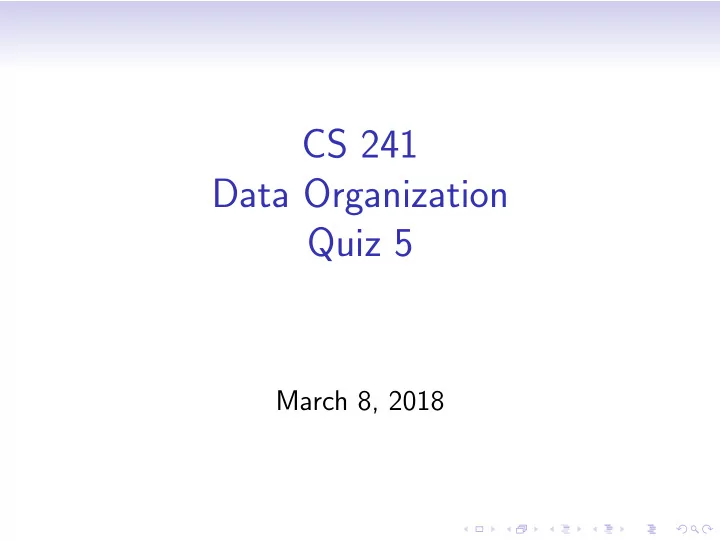

CS 241 Data Organization Quiz 5 March 8, 2018
Question 1: Structures and Functions struct Point {int x; int y;}; struct Point incPoint(struct Point p) { p.x++; p.y++; A p1=(4, 3) p2=(5, 4) return p; B p1=(4, 3) p2=(4, 3) } int main(void) C p1=(5, 4) p2=(4, 3) { D p1=(5, 4) p2=(5, 4) struct Point p1 = {4, 3}; struct Point p2 = incPoint(p1); E The value in p2 is printf("p1 =(\%d, \%d) unpredictable. p2 =(\%d, \%d)\n", p1.x, p1.y, p2.x, p2.y); }
Question 1: Structures and Functions struct Point {int x; int y;}; struct Point incPoint(struct Point p) { p.x++; p.y++; A p1=(4, 3) p2=(5, 4) return p; B p1=(4, 3) p2=(4, 3) } int main(void) C p1=(5, 4) p2=(4, 3) { D p1=(5, 4) p2=(5, 4) struct Point p1 = {4, 3}; struct Point p2 = incPoint(p1); E The value in p2 is printf("p1 =(\%d, \%d) unpredictable. p2 =(\%d, \%d)\n", p1.x, p1.y, p2.x, p2.y); }
Question 2: Pointer and Index int main(void) { char data [] = "computer science"; data [12] = ’*’; char *linePt = \& data [4]; *linePt = ’+’; printf("[\%s], [\%s]\n", data , linePt ); return 0; } A [computer science], [computer science] B [comp+ter sci*nce], [comp+ter sci*nce] C [comp+ter science], [computer sci*nce] D [comp+ter sci*nce], [uter sci*nce] E [comp+ter sci*nce], [+ter sci*nce]
Question 2: Pointer and Index int main(void) { char data [] = "computer science"; data [12] = ’*’; char *linePt = \& data [4]; *linePt = ’+’; printf("[\%s], [\%s]\n", data , linePt ); return 0; } A [computer science], [computer science] B [comp+ter sci*nce], [comp+ter sci*nce] C [comp+ter science], [computer sci*nce] D [comp+ter sci*nce], [uter sci*nce] E [comp+ter sci*nce], [+ter sci*nce]
Question 3: Pointers to Structures struct Point {int x; int y;}; void incrementPoint(struct Point *p) { A p1=(3, 3) (*p).x += 2; p->y += 2; B p1=(1, 3) } C p1=(1, 1) int main(void) D p1=(3, 1) { struct Point p1 = {1, 1}; E p1 = 2 incrementPoint (&p1); printf("p1=(%d, %d)\n", p1.x, p1.y); return 0; }
Question 3: Pointers to Structures struct Point {int x; int y;}; void incrementPoint(struct Point *p) { A p1=(3, 3) (*p).x += 2; p->y += 2; B p1=(1, 3) } C p1=(1, 1) int main(void) D p1=(3, 1) { struct Point p1 = {1, 1}; E p1 = 2 incrementPoint (&p1); printf("p1=(%d, %d)\n", p1.x, p1.y); return 0; }
Question 4: Pointers to Structures #include <stdio.h> #include <math.h> struct Point {double x; double y;}; void foo(struct Point *p) A p1=( 5, 4) { double d = sqrt ((p->x)*(p->x) B p1=( 0.78, 0.62) + (p->y)*(p->y)); p->x /= d; C p1=( 5.00, 4.00) p->y /= d; } D p1=( 0.60, 0.80) void main(void) { E p1=( 0.12, 0.98) struct Point p1 = {5, 4}; foo (\&p1); printf("p1 =(%5.2f, %5.2f)\n", p1.x, p1.y); }
Question 4: Pointers to Structures #include <stdio.h> #include <math.h> struct Point {double x; double y;}; void foo(struct Point *p) A p1=( 5, 4) { double d = sqrt ((p->x)*(p->x) B p1=( 0.78, 0.62) + (p->y)*(p->y)); p->x /= d; C p1=( 5.00, 4.00) p->y /= d; } D p1=( 0.60, 0.80) void main(void) { E p1=( 0.12, 0.98) struct Point p1 = {5, 4}; foo (\&p1); printf("p1 =(%5.2f, %5.2f)\n", p1.x, p1.y); }
Recommend
More recommend